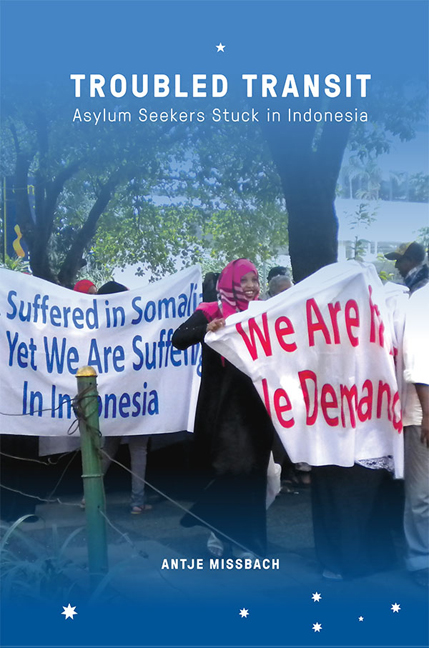Book contents
- Frontmatter
- Contents
- List of tables
- Acknowledgements
- Map of Indonesia
- Acronyms and Initialisms
- 1 Introduction
- 2 Transiting Indonesia: Past and Present
- 3 The Politics of Detention
- 4 Life on Hold
- 5 The Limits of Protection
- 6 Indonesia as a Transit State: Obligations, Policies, and Practice
- 7 Tidal Ebb and Flow: The Indonesia-Australia Relationship
- 8 Selling Hope
- 9 Conclusion
- Bibliography
- Index
- About the Author
5 - The Limits of Protection
Published online by Cambridge University Press: 19 May 2017
- Frontmatter
- Contents
- List of tables
- Acknowledgements
- Map of Indonesia
- Acronyms and Initialisms
- 1 Introduction
- 2 Transiting Indonesia: Past and Present
- 3 The Politics of Detention
- 4 Life on Hold
- 5 The Limits of Protection
- 6 Indonesia as a Transit State: Obligations, Policies, and Practice
- 7 Tidal Ebb and Flow: The Indonesia-Australia Relationship
- 8 Selling Hope
- 9 Conclusion
- Bibliography
- Index
- About the Author
Summary
Our soul (nyawa) is in their [IOM and UNHCR] hands.
(Interview with Rohingya refugee, 24 June 2010, Cipayung)
DISSIPATED PROTESTS?
In early November 2012, I was sitting in the ground-floor cafeteria of the building where the UNHCR registration office in Jakarta is located. Suddenly, half a dozen minibuses stopped next to the building. Out of the buses climbed a group of Somalis to stage a protest. On their posters were slogans such as “We need resettlement”, “Stop empty promises and empty hopes”, “We suffered in Somalia and yet we are suffering in Indonesia”, “We need durable solution not words”, and “Look at us, Listen to us, Don't ignore us, We are Somalian refugees”. Among the protesters was Ali, whose story is told in Chapter 1.
While they were getting ready for the protest, I had a quick chat with Ali. He told me that this protest action had been inspired by another Somali demonstration in Makassar, where a small group of refugees had gathered in front of the local UNHCR premises and complained about UNHCR and Australian discrimination against them (Abdurrahman 2012). The Makassar protesters, most of whom had lived there since 2010, criticized the fact that there were no Somalis among the refugees resettled in Australia. They had concluded that their exclusion from resettlement was a deliberate decision by the UNHCR and the resettlement countries; they demanded that they be resettled too. Driven by similar suspicions, the Somali protesters in Jakarta demanded a meeting with the chief UNHCR representatives to explain their frustrations. They were not granted a meeting and left the area less than two hours later. Their protest attracted neither an official response from the UNHCR nor any debate, other than minimal coverage in some local and national newspapers (“Heartbreaking Protest” 2012; Leribun 2012).
A few weeks later I visited Ali to bid him farewell before I returned to Melbourne. We discussed a number of things, including the protest in Jakarta. Even though he did not consider the action a success, he was glad that the Somali community in Puncak had been able to express their frustrations. The simple fact that they had managed to organize their travel from Puncak to Jakarta, to raise the money to rent vehicles, and to prepare posters indicated both the sincerity of their complaints and the strong cohesion within the Somali community.
- Type
- Chapter
- Information
- Troubled TransitAsylum Seekers Stuck in Indonesia, pp. 117 - 148Publisher: ISEAS–Yusof Ishak InstitutePrint publication year: 2015

